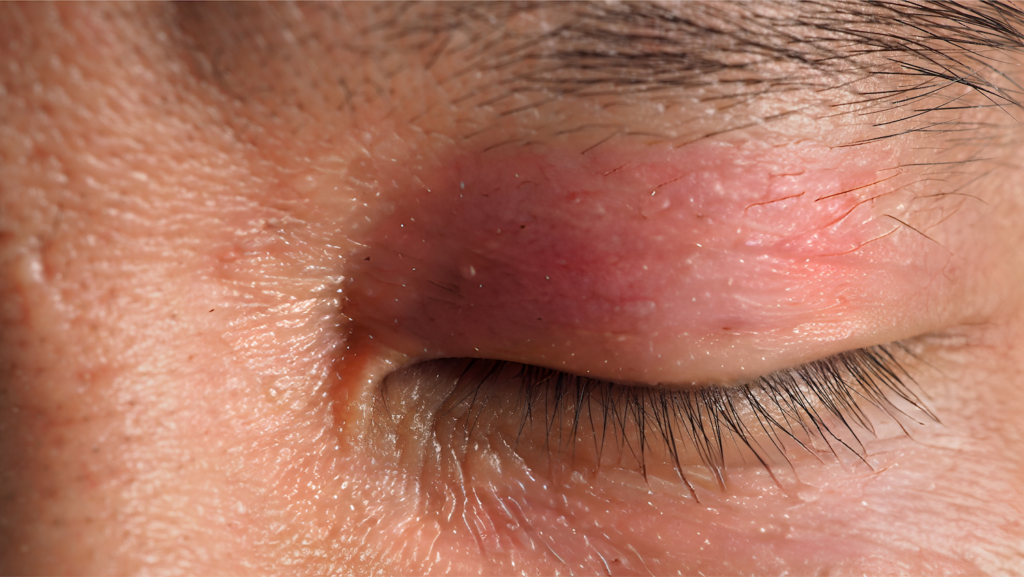🎄📦 Due to Xmas & New Year, the next dispatch dates are: 23rd Dec, 27th Dec, 30th Dec, and 2nd Jan.
-
NHS
-
Oldham Services
-
Shop
-
Help & Advice
-
🎄📦 Due to Xmas & New Year, the next dispatch dates are: 23rd Dec, 27th Dec, 30th Dec, and 2nd Jan.

If you’ve ever suffered from eczema around the eyes, also known as eyelid dermatitis, you know how sore it can be. The skin in this area is particularly thin and sensitive, making it prone to irritation and inflammation. Symptoms like redness, itching, and swelling are not only uncomfortable but can also impact daily life and self-esteem.
Eye eczema is a skin condition that causes inflammation of the eyelids and the surrounding skin. It affects the delicate area around the eyes, causing discomfort and visible symptoms. This condition can occur on both the upper and lower eyelids and sometimes extends to the skin near the eyes.
Eyelid eczema and dermatitis can be acute (short-term) or chronic (long-lasting), and their severity varies from mild irritation to more severe symptoms that can interfere with daily activities. While they share similarities with eczema in other parts of the body, the thin skin around the eyes requires special care and treatment.
Atopic eczema, also known as atopic dermatitis, is a chronic inflammatory skin condition that often affects people with a personal or family history of allergies. When this happens, it can cause:
Atopic eczema on the eyelids is often part of a more widespread eczema condition affecting other parts of the body.
Contact eczema is an inflammatory response when the skin comes into contact with irritants or allergens. There are two subtypes:
Symptoms of contact dermatitis on the eyelids include:
Seborrheic dermatitis is a chronic form of eczema that primarily affects areas of the skin rich in sebaceous (oil) glands. This condition is shared across all age groups, often manifesting as cradle cap in babies and dandruff in adults.
The symptoms of seborrheic dermatitis vary based on age and skin type. Common signs include:
What causes eczema on the eyelids varies, and identifying the specific cause can be challenging, as it may result in a combination of genetic, environmental and social factors:
If your symptoms persist or become much worse, you should consult a doctor or pharmacist to help identify the underlying cause.
How long eczema can affect your eyes will vary widely from person to person. For some, it may be a temporary issue that resolves quickly, while for others, it can become a recurring problem.
In cases of acute eczema on eyelids, often caused by contact with an irritant or allergen, you might notice symptoms improving within just a few days to a couple of weeks, especially if you can identify and avoid the trigger.
Chronic conditions like atopic eczema may linger longer, sometimes lasting for weeks or even months. Many people experience cycles of flare-ups and periods of calm intermittently. It’s not uncommon for symptoms to return, particularly during stressful times or when you’re exposed to known triggers.
The good news is that with the right treatment and skincare routine, you can manage your symptoms effectively and potentially reduce the length of time it lasts. If you find that your eczema gets worse despite your efforts, contact your doctor or pharmacist.
While it’s not always possible to completely prevent eczema around the eyes, there are several steps you can take to reduce your risk of flare-ups:
Emollients are moisturising treatments that help soothe and hydrate the skin. They’re often the first line of defence against eczema. Here are some popular emollients:
Apply these emollients regularly, even when your skin isn’t flaring up, to maintain hydration and skin barrier.
For more severe eczema, your doctor might recommend topical corticosteroids. These help to reduce inflammation and relieve itching. Two common options for treatment for eye eczema are:
Always use topical steroids as directed by your doctor or pharmacist, especially around the delicate eye area.
At Click2Pharmacy, our Online Eczema and Dermatitis Clinic offers a straightforward solution for managing eyelid eczema. Start by completing a quick online consultation, where you will provide details about your symptoms and medical history.
Once approved, our qualified prescribers will issue a prescription for effective treatments to help manage your condition. This way, you can access the care you need without the inconvenience of an in-person visit.
If you’re experiencing a flare-up or looking for effective ways to manage your eczema, our clinic is here to help. Visit our Online Eczema and Dermatitis Clinic today to take the next step toward managing your condition effectively.

